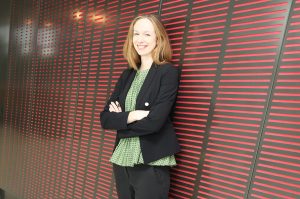RBWH researcher shines on global stage

Royal Brisbane and Women’s Hospital junior research fellowship Dr Kate Markey.
At only 33 years old, Dr Kate Markey is blazing a trail for junior researchers. Completing the combined MBBS/PhD at the University of Queensland and QIMR Berghofer Medical Research Institute while also achieving international recognition and funding, Kate credits her research for creating her career opportunities.
Kate was one of 20 researchers chosen to take part in the Translational Research Training in Haematology (TRTH) in Copenhagen and Milan in 2016, one of the first Australians invited. Later this year she will go to San Diego for the American Society of Haematology meeting as part of the TRTH year.
She was also recently awarded a $500,000 Junior Research Fellowship from Queensland Health for her research looking at predicting infection in patients undergoing chemotherapy and bone marrow transplantation.
“The fellowship is very generous and I wouldn’t have had the freedom to research without the grant,” Kate said. “It’s now my task to do some good with it, and generate data and good progress.”
Following an undergraduate degree in Chemical and Biomedical Engineering and an exchange to McGill University in the Montreal, Kate’s career in research skyrocketed. Mentored by Professor Geoffrey Hill, Kate now splits her time between her clinical position as a Haematology Advanced Trainee at the Royal Brisbane & Women’s Hospital, and her research position at QIMR Berghofer.
Kate’s research focus is the mechanism behind the relapse of leukaemia and infections in transplant recipients and the prediction of sepsis.
“Currently we don’t understand why one patient will be ok, and another with the same treatment will go to the ICU,” she said.
“We’re now looking at the febrile patient samples and investigating how we can tell which patients will get severe infections.”
While she’d love to find a faster way to diagnose sepsis, her real aim is working out how to predict and prevent it.
Looking to the future, Kate would like to continue in the infection and immunology research and how to solve these issues for her patient group and other patients.
“I would like to start own research group in future, and this fellowship is helping me learn how to run a small team, organise my own research budget, and split my time between the clinic and the lab.”
